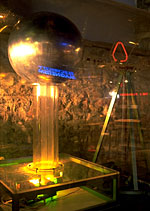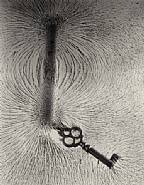PHYS 2321-03 "Physics 2'' -- Fall 2020
NEW STUFF
-
Watch this spot for new links. These
may include outlines and homework solutions.
Advice on homeworks
PhET Coulombs Law simulation
Textbook's chapter 23 PPT.
Link to Moodle page . This Moodle page will be used sparingly unless we go
online.
Course Description:
This course is a calculus-based
introduction to E&M (electricity and magnetism), waves, and optics. Topics
include Coulomb's
law (static electric forces), electric and magnetic fields,
electric potentials and potential energy, Maxwell's
equations, waves, sound, light, image formation, and diffraction.
Some basic electrical circuits will be discussed,
but we mostly leave this to electrical engineering courses. Here
we want to emphasize the theory and concepts inherent in all electric and
magnetic phenomena. This is a challenging course in that you must
continue applying what you learned in
PHYS 2311 (Mechanics and Thermodynamics) and your calculus
courses.
A tentative calendar of topics is outlined below.
Prerequisites:
You should have passed PHYS 2311 with a minimum Grade of D. This means you
also have Calculus I under your belt.
Schedule (tentative):
| Week of |
Topic |
Chapter(s) |
Tests |
| 8/10,12,14 |
Syllabus. Electric Charge and Force |
23 |
|
| 8/17,19,21 |
Electric Fields,Gauss' Law |
23/24 |
quiz1 |
| 8/24,26,28 |
Gauss' Law, Electric Potential |
24,25 |
quiz2 |
| 8/31,9/2,4 |
Electric Potential |
25 |
quiz3 |
| 9/7,9,11 |
Capacitance |
26 |
Exam I |
| 9/14,16,18 |
Current & Resistance, DC Circuits |
27,28 |
|
| 9/21,23,25 |
Magnetic Fields |
29 |
quiz4 |
| 9/28,30,10/2 |
Ampere's Law |
30 |
quiz5 |
| 10/5,7,9 |
Faraday's Law |
31 |
quiz6 |
| 10/12,14,16 |
Faraday's Law, Induction, Maxwell's Equations |
31,(32),(34) |
Exam II |
| 10/19,21,23 |
Waves, Sound, (Superposition) |
16,17,(18) |
|
| 10/26,28,30 |
Nature of Light, Image Formation |
35,36 |
quiz7 |
| 11/2,4,6 |
Image Formation |
36 |
quiz8 |
| 11/9,11,13 |
Wave Optics, Diffraction |
37,38 |
|
| 11/16 (Mon) |
Comprehensive Final at 4:15-6:15, Room TBA |
|
Final Exam |
Lab:
The lab for this class is Physics 2351. There is 1
section on Thursday at noon.
Labs will meet in Meyer 122. Your performance in the
lab has no direct effect on your grade in the lecture, however,
you will learn the PHYS 2321 material better if you work hard in the
lab.
You will have an
informational meeting with your instructor on the first week where you
will be assigned your first lab.
Grading:
In-class
|
Homework,
attendance |
25%
|
Quizzes
|
Quizzes (drop lowest score) |
25%
|
| Exams |
There will be two exams and a
final. |
50%
|
Total
|
|
100%
|
Your
final letter grade
is
calculated roughly as follows:
| <55 |
55-70 |
70-80 |
80-90 |
90-100 |
| F |
D |
C
|
B
|
A
|
I will not grade any "harder" than the
above. However, if the class mean drops below 75, I will grade more
leniently.
Other
Course Policies
Attendance will be checked by camera about once
per week and more thoroughly for the first week.
This is partly for contact tracing purposes. Attendance is
crucial on test days or due dates. It is also important for participation
in class activities and simply hearing lectures.
Let me know in advance (e-mail is good) if you think you will need to
miss class. If you miss a quiz or exam because of an
unforeseen emergency, let me know as soon as possible, and provide
proof of the emergency. The name and phone number of a relevant
authority figure (perhaps a parent) can be provided as proof.
Homework will consist of reading and working
problems from the textbook or the instructor.
Problem solving is a major part of physics and you need practice.
Homework turned in after the time it is due will be given 50% credit.
It will be scored on completeness and correctness, but not every problem will
be checked. You can discuss homework with your classmates, but don't copy
their work verbatim. Don't copy the solutions manual verbatim. Show your
work, don't just write down the final answer. After a warning, you'll be
docked points. Look for keys posted after the homework is due.
Turning in Homework
You must scan your homework (with phone apps like "AdobeScan")
and upload them in PDF format to a Google Drive folder for this
class: PHYS2321-Physics 2 . You must create a subfolder
with a name like Lastname_Firstname. Rather than returning graded pages to
you, your homework will be annotated directly on Google Drive to
indicate how your grade was determined.
Practice Quizzes / Self tests will be made available
online for each chapter or week of material. (See "Self Tests" below.)
These are multiple choice questions linked through the class web page
(not Moodle). The answers can be seen by clicking "Grade". I do not see
your answers and these do not count towards your grade.
Quizzes will usually be
given every week or two. I hope to give some in-class (with careful
handling), and some on-line via Moodle. The Moodle quizzes will be
limited in time to 10-20 minutes during a 20-30 minute window on weekends.
(Those with disabilities will have customized times.)
The class will be polled to find a good common time.
Moodle quizzes will consist of about 10 questions, mostly multiple choice.
You can only make up a quiz (in-class or Moodle) that was missed because
of a valid conflict or emergency. Let me know as soon as possible
(within 12 hours) if you miss a Moodle (or in-class) quiz.
I will try to arrange an in-person make-up at my office.
However, if a time cannot be arranged within 48 hrs of the test (72 hrs
for Friday tests), you may have to take a 0.
(For this reason, I will drop your lowest quiz score.)
Students won't be able to review their quiz until make-ups are done.
Exams will be given roughly
every 5 weeks (so that there are 2 plus a final). These will
weigh most heavily towards your class grade. The final exam will be
comprehensive, but will emphasize the last 3-5 weeks of material.
One or more of the exams may be given on Moodle (to save class time).
The same make-up rules used for quizzes apply (see above), but the
lowest exam score is not dropped.
Disruptions You can
ask questions during class, but don't interfere with
the learning of the students around you with irrelavent chatter.
Also, don't operate cell phones or laptops without my
permission during lectures. Try not to arrive late or get up
and walk out early (unless you are told to for being disruptive).
Calculators I encourage you
to use a calculator in this class. However, you may not use calculators
to store information for
tests and quizzes. (This includes writing equations on the lid.)
Tests and quizzes don't usually require much arithmetic, so the
calculator is mostly needed for homework.
Tutoring will be available from
the Physics Dept and Engineering sources.
Listen for announcements
in class. Of course,
you are welcome to drop by during my office hours!
Cheating During quizzes and exams it is important that
you do your own work without help from others in the class.
Getting help from or providing help to others during tests is considered
cheating. For homework, you can work together, but if it becomes
obvious that you are copying verbatim from a manual or another
person, you risk repercussions.
I reserve the right to give a 0 score and report students for
disciplinary action if I observe cheating. You will usually receive
a warning before severe penalties. Other penalties include
arbitrary point deductions and excluding the score from your average.
During in-class tests, you may not obtain information from electronic
devices.
If online tests are given, you will be expected to work alone unless
explicitly stated otherwise. You will sometimes be allowed to use
notes or other aids but you are
not to exchange any information with others, including someone not
in your class.
Code of Academic Student Conduct from the College of
A&S.
The University expects its students to conduct themselves in a
dignified and honorable manner as mature members of the academic
community and assumes that individually and collectively they will
discourage acts of academic dishonesty. The University also expects
cooperation among administrators, faculty, staff, and students in
preventing acts of academic dishonesty, in detecting such acts,
reporting them, and identifying those who commit them, and in providing
appropriate punishment for offenders. The University Code of Academic
Student Conduct is found in Appendix F of the Student Handbook:
http://www.onu.edu/student_life/student_conduct/student_handbook
Special accomodations.
Students requiring particular accommodations because of physical and/or learning
disabilities should contact the Student Disability Coordinator prior to or during the first week
of classes. For additional information, see: www.onu.edu/disability-services .
ONU Health & Safety.
In accordance with the University’s COVID-19 safety plan and the
Polar Pledge , all
students will wear face coverings at all times in academic buildings. Additionally, students
are to maintain a social distance of 6 feet when possible, especially when in conversation
with others, during academic course meetings, and while waiting for a classroom to open.
No eating or drinking will be allowed during course meetings. Students who violate this
policy will be asked to leave the building immediately and must comply with this request.
Additionally, students will be reported to the Office of Student Conduct for adjudication.
Students who are unable to wear a face covering will need to make arrangements for
accommodations with the Student Disability Coordinator prior to or during the first week of
classes. (
https://www.onu.edu/disability-services
).
Title IX.
Ohio Northern University does not discriminate or tolerate discrimination on the basis of
sex, gender, transgender status, gender identity, or gender expression in its educational,
extracurricular, or athletic programs, or in any admission or employment decisions. ONU
is committed to promptly and equitably responding to all reports of sexual discrimination
with the goal of eliminating the misconduct and/or harassment, preventing its recurrence,
and addressing its effects on any individual or the community.
To report sexual misconduct (violence) or sexual harassment, students may contact the
Title IX Coordinator, Liannie Parahoo, 419-227-0061, l-parahoo@onu.edu or one of the
Deputy Title IX Coordinators: Brian Hofman, 419-772-1878, b-hofman@onu.edu ; or Linda
Young, (419) 772-2438, l-young@onu.edu.
To confidentially discuss sexual misconduct (violence) or sexual harassment, students
may contact University Confidential Resources: Counseling Center, (419) 772-2190;
Health Center, (419) 772-2086; or Chaplain, (419) 772-2200. For more information, the
University's Sexual Discrimination Policy is available at www.onu.edu/title-ix.
SELF TESTS
Here are some "Test Bank Practice"
questions used for previous classes.
Chap. 23 Test Bank Practice
Chap. 23 - a few more
Practice questions
Chap. 24
Test Bank Practice.
Chap. 25
Test Bank Practice.
Chap. 26
Test Bank Practice.
Chap. 27
Test Bank Practice.
Chap. 28
Test Bank Practice.
Chap. 29
Test Bank Practice.
Chap.
30 Test Bank Practice. Typos: "m_0" stands for "mu naught" the
permeability constant. "p" in no. 2 stands for pi.
Chap.
31 Test Bank Practice. Typos: ?
Chap.
16 (waves) Test Bank Practice. Typos:
Chap.
17 (sound) Test Bank Practice. Don't worry about Doppler effect
questions (P. 9-10). P.7 should have T=1006N.
Chap.
35-36 (light/optics) Ignore polarization (#13-17).
#9 used to give the wrong answer, it should now give A.
Chap.
37. Test Bank Practice.
(Just do double slit interference)


